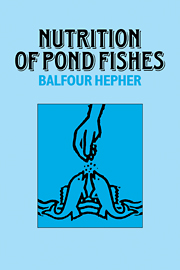Book contents
- Frontmatter
- Contents
- List of symbols
- Preface
- Introduction
- Part I FOOD REQUIREMENT
- 1 The balance of energy
- 2 Ingestion, digestion and absorption of food
- 3 Energy pathways
- 4 Maintenance
- 5 Growth
- 6 Requirement for protein
- 7 Other essential nutrients
- Part II FOOD SOURCES AND THEIR UTILIZATION
- Appendixes
- References
- Systematic index
- Subject index
- Frontmatter
- Contents
- List of symbols
- Preface
- Introduction
- Part I FOOD REQUIREMENT
- 1 The balance of energy
- 2 Ingestion, digestion and absorption of food
- 3 Energy pathways
- 4 Maintenance
- 5 Growth
- 6 Requirement for protein
- 7 Other essential nutrients
- Part II FOOD SOURCES AND THEIR UTILIZATION
- Appendixes
- References
- Systematic index
- Subject index
Summary
Growth depends on a number of various factors amongst which food ration and the weight of the fish are of special importance. When food is insufficient for both maintenance and growth, growth will be inhibited or will cease entirely. In order to determine the amount of food required for both maintenance and growth, it is necessary to know the maximum rate of growth possible when food is not limiting. This does not mean that at this growth rate food is utilized efficiently. It is often possible to achieve a high rate of growth at the expense of excessive food and low utilization so as to make this gain uneconomical. Therefore, the relationship between rate of growth and food utilization for growth must also be studied, which will be done in later sections (pp. 169, 301).
Growth is also a function of body size (weight). Body weight or length are the main parameters by which fish farmers determine the feeding level. If feed ration is to produce optimum growth, it is essential to learn the relationships between body weight (or length) and growth rate. This will also, therefore, be discussed in detail in a later section (p. 156).
Except food and weight, growth also depends on a number of other factors, which often interact with food ration and body weight. These were thoroughly reviewed by Brett (1979), therefore they will be discussed here only briefly.
- Type
- Chapter
- Information
- Nutrition of Pond Fishes , pp. 147 - 174Publisher: Cambridge University PressPrint publication year: 1988



